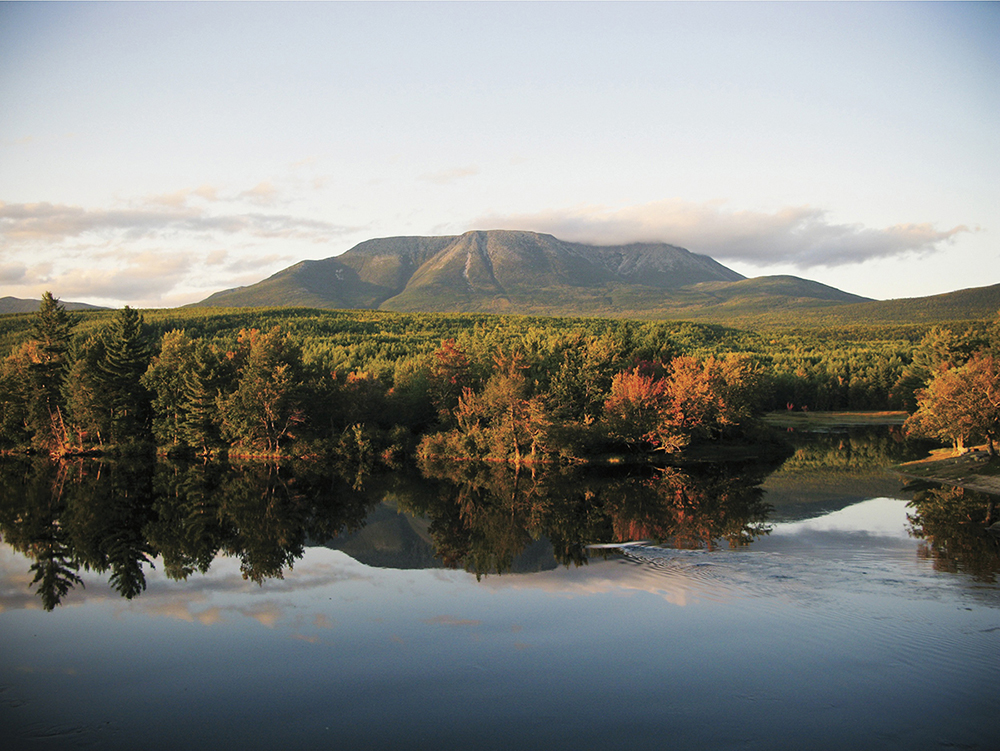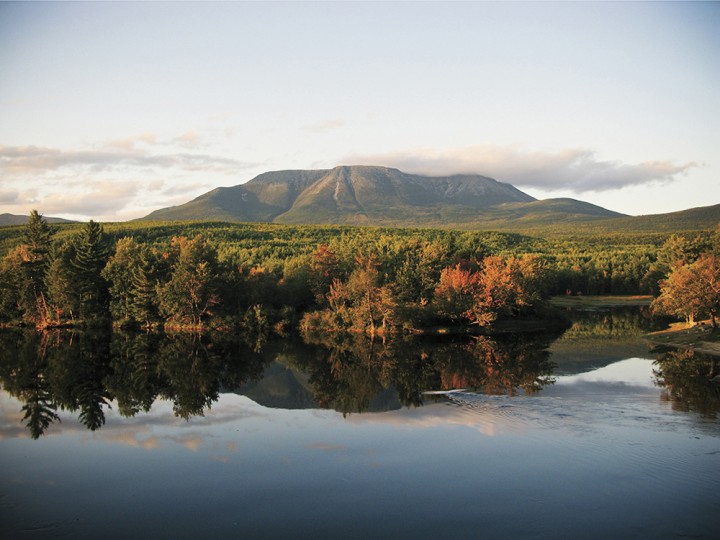Baxter State Park
Having Park Director Buzz Caverly show you around Baxter State Park is like having Emeril teach you how to cook. We’d been climbing Katahdin in the near darkness for more than an hour, at first lighting our way from Chimney Pond over the steep, boulder-strewn Saddle Trail by flashlight, then by the breaking dawn. On […]

The view of Mount Katahdin and the Penobscot River can be seen from Abol Bridge near Baxter State Park. Katahdin, Maine’s highest peak, is the northern terminus of the Appalachian Trail.
Photo Credit : Chris Bennett / Aurora PhotosHaving Park Director Buzz Caverly show you around Baxter State Park is like having Emeril teach you how to cook.

Photo Credit : Chris Bennett / Aurora Photos
We’d been climbing Katahdin in the near darkness for more than an hour, at first lighting our way from Chimney Pond over the steep, boulder-strewn Saddle Trail by flashlight, then by the breaking dawn. On the plateau we paused. Below, the North Woods seemed to stretch forever: all those lakes and ridges and timber; all that promise of bear and deer and moose. My companion, Irvin “Buzz” Caverly Jr., had seen this view hundreds of times. You didn’t hear him gush about its beauty; his feelings ran deeper than that. Instead he said simply, “This place doesn’t need advertising, does it?”
“This place” is Baxter State Park, that big green patch in the center of the map, about 60 miles north of Bangor, and nobody alive knows it the way Buzz Caverly does. He first came here as a ranger in 1960 at age 21 and didn’t leave until his retirement as park director in 2005. Baxter is where he brought his bride, where he raised his children. He refers to life outside Baxter as “downcountry,” admitting that he knows little of what goes on there. Of Baxter State Park’s 47 mountain peaks and ridges, of its 160 miles of trails, of its more than 200,000 acres, he’ll speak as intimately as another man might of his backyard.
Buzz Caverly was the last ranger who knew the remarkable Percival P. Baxter, who gave the park and its centerpiece, Mount Katahdin, to the people of Maine along with this enduring message: “Man is born to die. His works are short-lived. Buildings crumble. Monuments decay, wealth vanishes, but Katahdin in all its glory forever shall remain the mountain of the people of Maine.”
On the plateau I asked Buzz Caverly a question: If he were someday told that he’d have to leave Baxter State Park and would be allowed just one more day’s camping, where would he choose? His face grew pained. “First of all,” he said, “I wouldn’t go. I’d fight to stay.” But when pressed, he spoke about Russell Pond Campground as though it were sacred ground:
“You’re seven miles in by foot, so already you have solitude. If I don’t want to fish, I can hike. If I don’t want to hike, I can swim. If I don’t want to swim, I can take a canoe and paddle the lake. If I don’t want to canoe, I can climb Lookout Rock, or I can climb Katahdin. If I don’t want to climb Katahdin, I can go have a nap and listen to the wind blowing through. And if I don’t want to go to bed at night, the whippoorwills are going to put me to sleep. Now what else do you want for a life? ”Mel Allen
Mel Allen is the fifth editor of Yankee Magazine since its beginning in 1935. His first byline in Yankee appeared in 1977 and he joined the staff in 1979 as a senior editor. Eventually he became executive editor and in the summer of 2006 became editor. During his career he has edited and written for every section of the magazine, including home, food, and travel, while his pursuit of long form story telling has always been vital to his mission as well. He has raced a sled dog team, crawled into the dens of black bears, fished with the legendary Ted Williams, profiled astronaut Alan Shephard, and stood beneath a battleship before it was launched. He also once helped author Stephen King round up his pigs for market, but that story is for another day. Mel taught fourth grade in Maine for three years and believes that his education as a writer began when he had to hold the attention of 29 children through months of Maine winters. He learned you had to grab their attention and hold it. After 12 years teaching magazine writing at the University of Massachusetts-Amherst, he now teaches in the MFA creative nonfiction program at Bay Path University in Longmeadow, Massachusetts. Like all editors, his greatest joy is finding new talent and bringing their work to light.
More by Mel Allen

